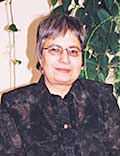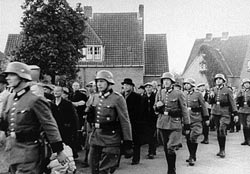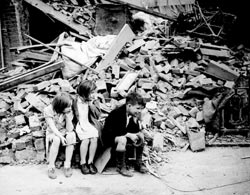|
“Please and Thank You!”
Nadezhda's Corner
 Надежда Никифоровна Рогожина
Надежда Никифоровна Рогожина, проректор по международным программам, зав. кафедрой лингвистики и межъязыковой коммуникации Самарского муниципального университета Наяновой, кандидат педагогических наук, доцент.
Директор негосударственного учреждения дополнительного образования “World Class-Samara”.
Dear Reader,
In November the Americans celebrate the Thanksgiving day and it just reminded me of a Mary Rau Foster’s article.
I would like to share it with you.
Nadezhda
“Please and Thank You!”
Much is written about the lack of civility1 that is so prevalent2 in public places. Missing from many places are the basics3 that we were taught as children, such as the words: “please and thank you.”
We see the evidence when people become frustrated4, disillusioned5, and fed up6 with the lack of common courtesies7 that make us a civilized group of beings. We see the lack of civility when others cut in front of8 us, with no acknowledgement of our presence, and in parking lots when someone takes the parking space for which we have clearly been waiting.
Some of you may recall a scene from the movie, “Fried Green Tomatoes9” where the main character has her parking space taken by a sassy10 young woman. When assertively11 confronted by the older woman about her actions, the younger woman retorted, “That is what happens when you are younger and faster” as she smugly12 walked across the parking lot. The older woman then backed up13 her bigger car and rammed it into14 the younger woman’s compact car several times. When the young woman screamed at her, the older woman replied, “That is what happens when you are older and have lots of insurance15.”
Our failure to speak and act in a manner that demonstrates our respect for others, and their rights, may cause them to feel insignificant16. Each of us wants to feel appreciated by others. Lack of respect from others can make us feel even more invisible that we may already feel in our busy society.
So what is the source of this problem? The causes are many (perhaps because of the values acquired as children or because of a lack of respect for ourselves), but the solution is simple...
Think before you speak. Make eye contact with others. Say, “Please and thank you.” Respect others.
Our lives may be very busy and our time seemingly in short supply17. However, kindness and consideration18 has a way of saying to each of us... You matter!
Mary Rau Foster.
1 civility – вежливость
2 prevalent – общепринятый
3 basics – основы
4 frustrated – расстроенный
5 disillusioned – разочаровавшийся
6 fed up – (разг.) сытый по горло
7 courtesy – учтивость
8 to cut in front – (автом.) подрезать (вклиниваться спереди)
9 Fried Green Tomatoes – худ. фильм-мелодрама (США, 1991)
10 sassy – нахальный
11 assertively – напористо
12 smugly – самодовольно
13 to back up – давать задний ход
14 to ram into – врезаться
15 insurance – страховка
16 insignificant – ничтожный
17 in short supply – дефицитный
18 consideration – предупредительность, уважение
Remembrance Day
You may remember my Dutch friends, George and Truus, about whom I have written before in School English. I sent them, as I usually do, a calendar for the coming year and, in thanking me, George commented, “Thank you for sending the Calendar for 2008. I am always glad to receive it, but also a little bit sad because it means that this year is almost over.”
He went on to mention some of his experiences during WWIII when the Netherlands, like most of Europe, including a large part of the USSR, was occupied by German troops.

A round-up in Netherlands, 1940s
“The 11th November is a memorable date for me. In 1944 there was a bomb attack on RoermondII and a bomb fell in the middle of the street near our house. We, that is my parents with their seven children, were sheltering1 in the cellar. The two houses next to us were totally destroyed and our house was rendered2 uninhabitable, but we were lucky and there was no harm to any of us. The bomb attack killed 33 persons in the town that day. And this was just the beginning of a very bad time for all of us in Roermond, with ‘razziasIII’ on men for forced-work in Germany, the killing of other menIV and real terror for all. The conscripted3 men were transported to Germany to do forced work and most of the women and children were evacuated elsewhere because Roermond was declared a front-line town (Truus and her family stayed for 14 weeks in FrieslandV). Roermond was a ghost town4 where we remained, living with two families in one house (in the cellar with a sick grandfather) until we were liberated on 1 March 1945. This time was later called “Het verdriet van Roermond” (The sorrow5 of Roermond).”
This harrowing6 personal account reminded me of some of my own experiences during that time – not that they compared with the severe7 conditions endured by George and other people in occupied Europe who did not collaborate with the invadersVI:
The 11th November is our Remembrance SundayVII when ceremonies are conducted and church services are held throughout the land as we remember those killed in the various wars of the 20th and 21st centuries. I think sometimes that it would be good if as much attention was given to those who served but did not die, as it was often just a matter of chance – a bullet an inch or two either way making the difference. A hundred years ago we had a great author, poet and Nobel LaureateVIII, Rudyard KiplingVIII, who wrote about the way everyone needs and respects a soldier when danger threatens, but forgets him when the danger has passedX. That is as true today as it was then unfortunately.
It was interesting to read of George’s experiences during the warXI and the memories that are obviously fresh with him still. I think we in England had things much easier by comparison8. I have also been reading an autobiography by an American radio and TV personality, Walter CronkiteXII, who was a war correspondent during WWIIXIII, and I think none of us who lived through those times will ever forget them.
We were very fortunate that we were not occupied and the severe bombing continued for only a few years at the beginning and culminated in V1 (flying bomb) and V2 rocketXIV attacks at the end. We too had a near miss as the house next to ours (it was semi-detached9, so it was part of the same structure) was destroyed by a bomb and the dividing wall collapsed10 so that the interior of our house was open to passers by like an open dolls’ house. At the time, I was aggrieved11 to have missed the excitement as I was in hospital having my appendix removed. I cannot imagine how worried my parents must have been by it all happening at once. When I got home, my cousin and I had the job of keeping looters12 (and the curious) from creeping13 underneath the temporary tarpaulin14 into our house. I am ashamed to say that it all seemed a game to me at that age; I could remember only very little about life before it started, so it was just normal for me. Many houses were destroyed in our area as it was near the vital15 London docks, a prime target for the LuftwaffeXV, but the vacant sites were exciting places for us to play amongst the debrisXVI.
My school continued throughout the war and the local library remained open most of the time so I was well occupied as I was an enthusiastic reader, generally preferring a book to playing team games.

Children in London, 1940
In a typically English way, queues were (and still are) a feature of life and I remember often being parked in one queue to keep the place while my mother joined another. Sometimes, neither of us knew what the queue was for until we reached the front. If there was a queue, you joined it automatically hoping that there would be something worth having if one got to the front before the supply ran out. If you had the necessary money and ration coupons16, you bought whatever was selling, knowing that if you didn’t need it, some relation, friend or neighbour almost certainly would. Sometimes we never knew what strange things were sold under the name of ‘meat’ or ‘fish’ and transformed by my mother into meals for a week with delicious gravy17 towards the end – it was probably better that we didn’t know! ‘Potato and gravy’ was a staple18 and a favourite. We kept chickensXVII in the back yard, so we often had eggs to eat or give away – I don’t think we would have dreamed of selling or bartering them – but some other hard-to-get item would probably appear in an informal exchange. There were shops which sold only young chicks: cheaper day-old ones, when one took a chance on their sex, or slightly more expensive ones which were segregated19 into males and females, cocks and hens, the former being preferred for their meat and the latter for their eggs. The fluffy20 yellow balls could be seen in the shop window crowded around a shielded light bulb or tiny paraffin heater21. I am afraid that few reached maturity. There was often a pot simmering on our stove which smelt obnoxious22 but which contained food for the chickens: potato peelings, vegetable scraps, etc, to supplement their bran23 or corn if we could get it. All year long, durableXVIII food supplies were hoarded24 to make a Christmas cake: a little margarine, a few nuts, dried fruit, some suet25, etc, and all the family would contribute ingredients to its making. The baking was a job which usually fell to my mother. I think that was because she was the best cook in the family – but perhaps it was because we could contribute eggs! I don’t know why that cake held such significance, but it seemed to be a symbol of defiance26 that we would carry on as usual despite Hitler and nothing would stop us. Again, I sometimes wonder what strange things went into that cake and I have never liked Christmas cake since. To this day, like many of my contemporaries, I can’t shake off27 the habit of hoarding tinned28 food, even though it is now cheap and plentiful.
To be concluded…
- by David Wright (UK)
I The Second World War which lasted from 1939 to 1945 – also known in Russia as the Great Patriotic War after the breach in 1941 of the so-called Molotov-Ribbentrop Pact, officially (in English) the Treaty of Non-aggression between Germany and the Union of Soviet Socialist Republics
II A town and district in the south-eastern part of the Netherlands.
III A Dutch (and German) word for a police raid or round-up.
IV Those who resisted or were unfit for work, eg too old, crippled, etc.
V A district in the north of the Netherlands which has its own dialect, different from that spoken in Roermond or Geleen where George and Truus now live. Some people there even want it to be an independent country!
VI Many of the French did collaborate and were allowed a degree of self-governance in what was called Vichy France. Other countries like Spain, Ireland and the Vatican helped the Nazis in less conspicuous ways. Italy joined Germany in the Axis until it was clear that the Allies were going to win when they changed sides again.
VII This is the date when the Armistice was signed in 1918 bringing to and end the fighting in WWI.
VIII He was sounded out for the post of Poet Laureate, the title for the National Poet, and for a knighthood, but declined both honours. He was the Nobel Laureate for Literature in 1907 when he was the first English language winner and was (and is) the youngest ever winner.
IX Named after a Lake in Staffordshire, not far from Runcorn (my home town), where his parents courted. He died a few months before I was born.
X One of his most famous poems on this theme is “Tommy” – the archetypical name given to British soldiers of that era, like ‘Fritz’ for Germans, ‘Ivan’ for Russians, ‘GI Joe’ for US, etc. These names tended to be given to those whom we even grudgingly respected for their professionalism – I cannot recall one for French or Italians, they were more commonly known generically as Frogs and Wops respectively! Of course, one would not dream of using such pejorative and non-PC names today.
XI I still think of WWII as the war!
XII Originally Krankheidt – he had Dutch and German grandparents.
XIII He lived and worked for the United Press in Moscow for some years.
XIV The first of these was the V1, or ‘flying bomb’, a massive but slow and inaccurate weapon; followed by the more fearsome V2 which approached unseen and unheard.
XV German air force.
XVI A French word pronounced like deh-bree, which we appropriated as spoils of war! It can have various meanings depending on the context: ruin; the remains of something which has been destroyed; pile of rubbish or garbage; remains from landslides, volcanoes, avalanches or storms; floating rubbish in the sea or ocean cf flotsam; odd bits and pieces in space; etc, but for me, it will always conjure up memories of bombed out houses.
XVII Usually we kept bantams, which were smaller than common hens, but were hardy, needed less food and were prolific layers.
XVIII Nobody had refrigerators in those days – not in our part of the country anyway.
1 to shelter – укрываться
2 to render – приводить в какое-л. состояние
3 conscripted – рекрутированный
4 ghost town – опустевший город
5 sorrow – скорбь
6 harrowing – душераздирающий
7 severe – суровый
8 by comparison – при сравнении;
9 semi-detached – имеющий общую стену
10 to collapse – разрушаться
11 aggrieved – огорчённый
12 looter – мародер
13 to creep – красться
14 tarpaulin – брезент
15 vital – жизненно важный
16 ration coupon – продовольственная карточка
17 gravy – подливка
18 staple – основная еда
19 segregated – разделённый
20 fluffy – пушистый
21 heater – обогреватель
22 obnoxious – отвратительный
23 bran – отруби
24 to hoard – запасать
25 suet – нутряное сало
26 defiance – пренебрежение, сопротивление
27 to shake off – избавляться
28 tinned – консервированный
Читать еще в этой рубрике:
Читать еще в этом номере:
|
|











